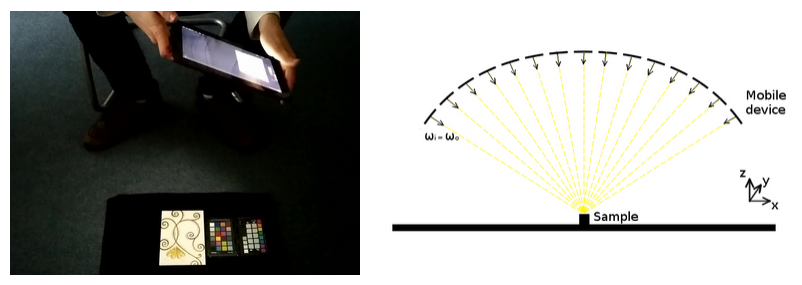Computer Graphics Forum 2016
SIGGRAPH 2014 poster
Jérémy Riviere¹ Pieter Peers² Abhijeet Ghosh¹
Imperial College London¹
College of William and Mary²
Fig. 1: Examples of surface reflectance recovered using mobile reflectometry. (a) Rough specular sample. (b) Highly specular sample with surface detail enhancement. (c) Larger specular sample resolved using appearance transfer.
(a) Camera-flash pair setup (b) LCD panel setup
Fig. 2: Mobile surface reflectometry setups: (a) Camera-flash pair for hand-held acquisition of rough specular samples. (b) LCD panel setup for highly specular samples.
Abstract: We present two novel mobile reflectometry approaches for acquiring detailed spatially varying isotropic surface reflectance and mesostructure of a planar material sample using commodity mobile devices. The first approach relies on the integrated camera and flash pair present on typical mobile devices to support free-form handheld acquisition of spatially varying rough specular material samples. The second approach, suited for highly specular samples, uses the LCD panel to illuminate the sample with polarized second order gradient illumination. To address the limited overlap of the front facing camera’s view and the LCD illumination (and thus limited sample size), we propose a novel appearance transfer method that combines controlled reflectance measurement of a small exemplar section with uncontrolled reflectance measurements of the full sample under natural lighting. Finally, we introduce a novel surface detail enhancement method that adds fine scale surface mesostructure from close-up observations under uncontrolled natural lighting. We demonstrate the accuracy and versatility of the proposed mobile reflectometry methods on a wide variety of spatially varying materials.
Publication: Mobile surface reflectometry. Jérémy Riviere, Pieter Peers, Abhijeet Ghosh. Computer Graphics Forum, 35(1): 191–202, 2016. doi:10.1111/cgf.12719.




